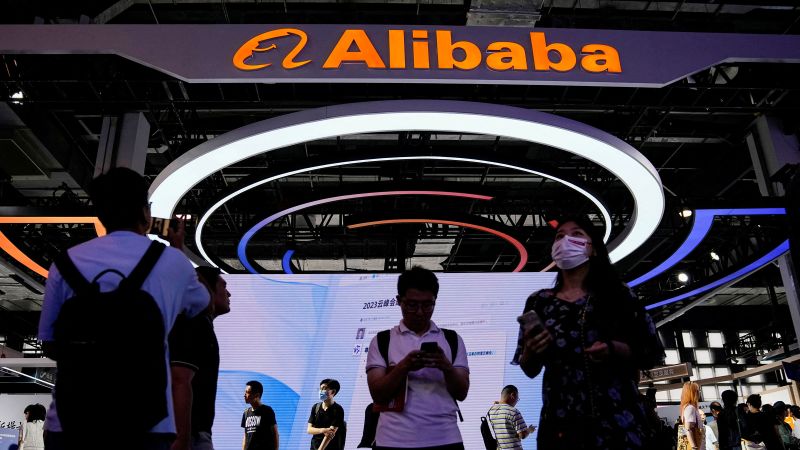Apple, the renowned technology firm headquartered in Cupertino, California, has entered a partnership with Chinese tech behemoth Alibaba to introduce artificial intelligence (AI) services in China. This decision marks a significant shift for Apple, allowing the company to address months of uncertainty regarding its operations in the world’s largest mobile phone market. With this collaboration, Apple aims to enhance its AI capabilities for its mobile devices and cater to Chinese consumers more effectively.
Joe Tsai, the chairman of Alibaba, made a noteworthy announcement during the World Governments Summit held in Dubai, where he stated, “Apple has been very selective. They talked to a number of companies in China, and in the end, they chose to do business with us. They want to use our AI to power their phones.” This revelation underscores Apple’s careful approach in selecting a partner that aligns with its strategic objectives in the complex Chinese market. However, Tsai did not divulge additional details concerning the timeline for the rollout or whether Alibaba would be the sole partner for Apple’s AI endeavors.
The partnership news first surfaced through a report by The Information, revealing that Apple had considered several other Chinese AI companies, including DeepSeek, Baidu, ByteDance, and Tencent, before finally deciding on Alibaba. This development indicates Apple’s cautious yet optimistic approach to navigating the intricacies of operating in China, particularly in light of stringent local regulations that govern foreign tech companies.
Recent regulations in China require that foreign AI operators collaborate with local firms and obtain necessary regulatory approvals prior to offering their services. Consequently, Apple had previously restricted its AI service, known as Apple Intelligence, to select markets—namely, the United States, Canada, the United Kingdom, and Australia. The partnership with Alibaba is anticipated to ease Apple’s path into the Chinese market while adhering to local compliance requirements.
In recent years, Apple has been grappling with a decline in its market share in China, facing stiff competition from domestic rivals, including Huawei and Vivo. Lucas Zhong, a research analyst at Canalys, remarked that while the introduction of AI services could attract more users to Apple’s products in China, significant challenges remain. He asserted, “Apple faces a much more challenging competitive landscape in China, especially amid Huawei’s strong resurgence.” Zhong emphasized that relying solely on AI services might not be sufficient for Apple to regain its competitive edge.
Historically, Apple maintained a stronghold over China’s high-end smartphone market. Nevertheless, Huawei’s ascension posed a formidable threat, particularly following the trade restrictions imposed by the U.S. government under the Trump administration in 2019. Initially, these restrictions severely impacted Huawei’s operations. However, they ultimately spurred the company to innovate, leading to the launch of its Mate 60 Pro in 2023, which subsequently ignited an investigation by the U.S. government.
Despite these challenges, Huawei has seen a resurgence, capturing a significant portion of the market. Recent data from Canalys shows that as of 2022, Huawei commanded 16% of the Chinese smartphone market, slightly surpassing Apple’s 15%. In 2023, Apple rebounded to reclaim the top spot as the leading mobile phone seller in China, achieving a market share of 19%, while Huawei trailed with 12%.
The confirmed partnership with Apple has positively influenced Alibaba’s stock performance, with shares listed on the Hong Kong stock exchange surging by over 40% from a two-year low reached in January. This surge reflects the market’s renewed confidence in Alibaba’s potential to grow alongside Apple in the AI sector.
In a related note, following the introduction of a novel AI model by Chinese startup DeepSeek in January, Alibaba unveiled its latest Qwen AI model, claiming it outperformed its competitor’s R1 model. The competitive landscape in the AI domain is heating up, with notable figures like Elon Musk also entering the fray. Speaking via video at the Dubai summit, Musk announced that his company, xAI, would imminently release Grok 3, which he touted as the best AI chatbot currently available.
Musk’s assertion, backed by results from preliminary tests, exemplifies the heightened competition among tech giants as they vie to dominate the AI market. Musk founded xAI with aims to challenge other established AI companies, including OpenAI and tech juggernaut Google. As significant partnerships and innovations continue to emerge in this technology-driven landscape, the collaboration between Apple and Alibaba could shape the future of AI in mobile technologies, especially within the fast-evolving Chinese market.











